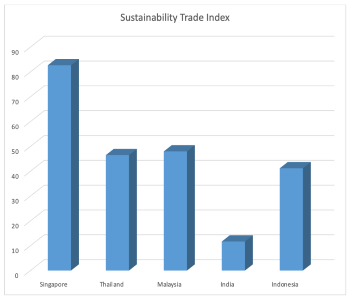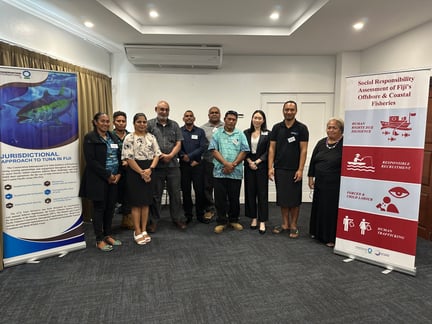Organizations are prioritizing corporate sustainability initiatives and making changes to their operations and practices to reduce their impact on the environment and promote social and economic responsibility.
Reducing carbon emissions, improving resource efficiency, promoting diversity and inclusion, and creating a positive social impact. Organizations are also increasingly recognizing the need to incorporate sustainability into their overall business strategy to remain competitive and meet the expectations of stakeholders.
Natural Calamities and Renewed Interest in Sustainability
The renewed interest from organizations towards sustainability has been driven by natural calamities such as typhoons, floods, changes in local weather, etc. that we have seen in recent history. Organizations now understand that for their business sustainability, they ought to be embracing sustainable business practices in their decision-making processes and to have a balance between social, environmental, and economic factors.
ESG Performance and Investor Confidence
If you analyze the data from any major stock exchanges, it is quite evident that organizations that have catered to sustainability provide a greater confidence to investors and provide higher returns since such organizations consider risk-management of relevant sustainability elements. ESG performance plays a significant role in this regard.
The Pandemic's Impact on Sustainability and Regional Focus
The pandemic has had an impact on sustainability, with some organizations shifting their focus to more immediate concerns and others doubling down on their sustainability efforts. The Asia Pacific (APAC) region also has a growing focus on sustainability, driven by factors such as environmental regulations, consumer demand, and the need to meet sustainability targets set by international organizations. This trend is likely to continue in the coming years, leading to further growth in the number of sustainable businesses in the region.
Sustainability Reporting and Regional Initiatives
The pandemic has driven a rise in the prevalence and intensity of values-based consumers who are rethinking their priorities, focusing more on the environment, and beginning to pressure brands to act. To spur sustainable investments, countries including India, Malaysia, and Thailand published guidance on their Environmental, Social and Governance (ESG) guidelines and sustainability reporting. APAC is expected to see up to $250 bn in new renewable investments by 2025.
Sustainability in UAE:
The UAE President has announced 2023 as the Year of Sustainability with a theme, ‘Today for Tomorrow’. It will focus on environmental sustainability by inspiring collective action through a nationwide commitment towards sustainable practices. UAE has pledged a reduction of 23.5% in GHG emissions for the year 2030, relative to the business-as-usual scenario.
Companies in the UAE are expected to align their operations with these goals and adopt sustainable practices, such as reducing carbon emissions, improving energy efficiency, and investing in renewable energy.
Sustainability in Australia:
Australia has a strong focus on sustainability, particularly in the areas of renewable energy and climate action.
The bushfires in Australia in late 2019 and early 2020 released an estimated 715 million tons of carbon dioxide into the air. Most believe that climate-change is just one of the many factors behind the inferno. It is for this reason that some business leaders want the government to adopt a tougher climate policy.
The Australian Government has introduced the Climate Change Bill 2022 that commits to reduce greenhouse gas emissions by 43% below 2005 levels by 2030, and net zero by 2050. The Australian government has introduced policies to encourage sustainable business practices, such as tax incentives for renewable energy investments. Companies in Australia are expected to adopt sustainable practices, such as reducing their carbon footprint, promoting biodiversity, and improving resource efficiency.
Sustainability in India:
India has a growing focus on sustainability, particularly in the areas of renewable energy and climate action. India has pledged that it will meet 50 per cent of its energy requirements from renewable sources by 2030 and achieve a net zero by 2070. The Indian government has also introduced policies to encourage sustainable business practices, such as tax incentives for renewable energy investments. Sustainable business practices are gaining momentum in India, with a growing number of companies recognizing the importance of environmental, social, and economic sustainability.
Renewable Energy and Carbon Emissions in India
India had set a target to install 175 GW of renewable energy capacity by 2022, with a focus on solar, wind, and bioenergy. This is expected to drive significant investment in the renewable energy sector and reduce the country's reliance on fossil fuels.
India is one of the largest emitters of carbon dioxide in the world but is taking steps to reduce its carbon footprint. This includes initiatives such as the National Action Plan on Climate Change and the National Solar Mission, which aim to promote the use of renewable energy and reduce carbon emissions.
Conclusion: The Importance of Adopting Sustainable Business Practices
This highlights the importance of adopting sustainable business practices to meet the environmental, social, and economic challenges of the 21st century. Globally, there has been an increased focus on sustainability in recent years, with many organizations committing to sustainability targets and implementing sustainable practices. This has likely led to an increase in the overall level of sustainability in the business world.
It is worth noting that sustainability is an ongoing process, and organizations are continually making efforts to improve their sustainability performance.

Source: Visual Capitalist
Sustainability is a crucial aspect of our lives and the future of our planet. Ensuring that the resources we use today will be available for future generations & economic growth.
How can LRQA support?
LRQA, a global provider of assessment, certification, and training services, can support the Year of Sustainability for its key stakeholders in several ways, especially:
-
Sustainability certification:
LRQA has a suite of products under sustainability certification/verification services to help organizations assess and improve their environmental, social, and economic performance. This includes certifications such as ISO 14001 (Environmental Management Systems), ISO 50001 (Energy Management Systems) and verifications such as ISO 14064 (GHG Validation and Verification), ISO 14067 (Product Carbon Footprint Verification).
-
Training and consultancy:
LRQA provides training and consultancy services to help organizations integrate sustainability into their operations and strategies. This includes sustainability workshops (on-site, remote, and blended), leadership training, and sustainability strategy development.
-
Supply chain assessments:
LRQA offers supply chain assessments to help organizations evaluate the sustainability performance of their suppliers and take action to improve sustainability throughout their value chain.
Overall, LRQA can support by providing its key stakeholders with the tools, knowledge, and support they need to adopt sustainable business practices and achieve their sustainability goals.
You can also Join our Journey to a Brighter Future through our Free Webinar on Addressing Climate Change and Energy Crisis.









